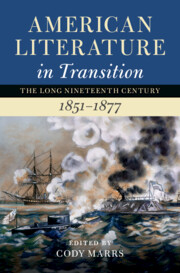Book contents
- American Literature in Transition, 1851–1877
- Nineteenth-Century American Literature in Transition
- American Literature in Transition, 1851–1877
- Copyright page
- Contents
- Figures
- Contributors
- Series Preface
- Introduction
- Part I Careers
- Part II Networks
- Part III Exchanges
- Chapter 13 Literature and/as Philosophy
- Chapter 14 Literature and/as Science
- Chapter 15 Literature and/as Ecology
- Chapter 16 Literature and/as Economics
- Part IV The Long Civil War
- Index
Chapter 16 - Literature and/as Economics
from Part III - Exchanges
Published online by Cambridge University Press: 15 June 2022
- American Literature in Transition, 1851–1877
- Nineteenth-Century American Literature in Transition
- American Literature in Transition, 1851–1877
- Copyright page
- Contents
- Figures
- Contributors
- Series Preface
- Introduction
- Part I Careers
- Part II Networks
- Part III Exchanges
- Chapter 13 Literature and/as Philosophy
- Chapter 14 Literature and/as Science
- Chapter 15 Literature and/as Ecology
- Chapter 16 Literature and/as Economics
- Part IV The Long Civil War
- Index
Summary
The mid-1800s in the United States witnessed not only a revolution in market capitalism but also in literature. This essay, accordingly, covers an era in which both capitalism took command of social life in the United States and literary discourse attempted to elevate itself into Literature. The cultural reach of the market, as evidenced by increasing textual engagements with Wall Street as a metonym for US finance, intensified at the same time as Romantic writers like Henry David Thoreau moved to Walden to live deliberately and fictional characters like Bartleby preferred not to. Scholars have imagined these two developments as opposite or separate spheres that, perhaps through the evolution of professional authorship, occasionally rubbed up against one another: literature and economics. This account holds that although literature could not escape its mediated relationship with readers through the marketplace, literary discourse attempted to transcend the sordid realities of capitalism.1 And, concomitantly, economic writing, in one influential account of nineteenth-century political economy, veered toward facts to distinguish itself from imaginative literature.2 Generically, then, these two domains started to diverge in the mid-century, a migration that at the same time illuminates literature’s propensity to function as economics.3
Keywords
- Type
- Chapter
- Information
- American Literature in Transition, 1851–1877 , pp. 255 - 270Publisher: Cambridge University PressPrint publication year: 2022

